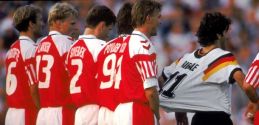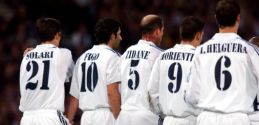
UEFA hide behind an empty fine as tensions continue
by Robert O’Connor
Polish taunting of ethnic Lithuanians at August’s Europa League qualifying match between Lech Poznan and Zalgiris Vilnius in Poland was to most observers little more than a symptom of the increasingly fractious relations between the two countries, albeit on a more internationally conspicuous stage than the usual diplomatic discourtesies and thinly euphemised needling that now dogs their relationship at ministerial level.
The unfurling of a 50-foot banner declaring ‘Lithuanian cad, kneel before your Polish master’ drew swift condemnation from foreign ministries on either side of the border but the lack of any punitive action from the state or footballing authorities reflects two communities made weary by years of ethnic tensions that have decayed a formerly strong fraternity. As the resolve to restore that brotherhood weakens amongst the leadership, a grassroots campaign to promote unity on and off the pitch is beginning to go viral.
That the meeting between Lech and Zalgiris sparked trouble came as no great surprise to anyone. The day before the first leg in Vilnius the county police headquarters issued a warning via the club’s website that any crowd trouble would be put down with swift and forceful retribution and hours before kick-off footage began circulating on YouTube of small armies of visiting supporters roaming the city centre.
No violence was reported during or after the match but the sense of anticipation was intense, and scores had turned out primed and ready to capture any ethnically-fuelled disruption for the global cyber market.
Seven days later in Poznan tensions boiled over. Or rather a carefully planned and rigorously organised hate protest, if local commentators are to be believed. Leader of the political party Electoral Action of Poles in Lithuania, Valdemar Tomaševski, stated in the aftermath that the banner couldn’t possibly have entered the stadium without specialist help, pointing the finger at the Lithuanian Special Services and in the process intimating at an act of state sponsored sabotage of the wilting bid for détente.
The foreign ministers of Lithuania and Poland kept up appearances and condemned the banner, with the latter tacking on a cursory apology, before both summarily closed the book on the incident with currently no internal investigations pending.
UEFA responded in the only way it knows how by splashing a €5000 fine in the ocean of Lech’s coffers and closing off part of the Miejski Stadium for Poznan’s next European tie, none of which did much to correct the governing body’s image as being totally remote from any prospective solution to the problem of racism in European football.
In issuing the punishment the disciplinary committee couldn’t muster the interest to verbally censure what happened in Poznan and the affair has now moved, in any official sense, off the radar of the responsible authorities at both footballing and state level. Even from this distance the listlessness of the response has been palpable.
In response an online campaign organised by World Economic Forum founder Mykolas Majauskas has forced the authorities’ insipid reactions off the news sites, and all the talk is of a new network of grassroots activists who have organised to promote commonality between the warring states. The Poland Loves Lithuania movement has landed a firm punch in the face of policy-making at state level and at the respective FAs, where politicking has allowed a dispute that began over the prohibition of the use of Polish surnames amongst immigrant populations living in Lithuania to foment ethnic tensions in public life.
This reached a crescendo with the unfurling of the banner when Zalgiris visited Poznan, but the simply-branded crest of the PLL activists – both countries’ flags placed side by side in a heart-shaped boarder – is suddenly reclaiming the public space, both digitally and physically, in the name of brotherhood in a way that state and sport have failed to.
“Although we can’t change the opinions of others, we can choose how we respond to them” reads a mission statement released by the movement. European football might be in a rather different state if UEFA subscribed to this doctrine of dealing with unsavoury behaviour.
But instead the disciplinary process on the continent continues to be shackled by lacklustre and derisory gestures of recrimination, a nod to soft-handed coercion rather than a wilful effort to educate and reform. Michel Platini would do well to dispatch a delegate or two to see what can be learned from Lithuania and Poland in the on-going fight against prejudice. Just as long as they do their digging at the more enlightened end of the political ladder.
More of Robert O’Connor’s writing can be seen on his brilliant blog and he can also be found on Twitter
Image: Wikimedia Commons / Bearas
Tags:Share this article
Leave a comment
- When did co-commentary become such a serious and miserable business?
- Why do we devote so much time to sharing our love of football for free?
- Villa’s Tokyo downfall: The apparent formality of a world title match
- Son Heung-min and the forgotten wonder goals
- Guess the Premier League goalscorer from the GIF
- A fateful flight
- Goodbye to the instant analogue gratification of Ceefax
- Player Profile: Steve Ogrizovic
- Rejecting FA Cup money in favour of a car boot sale
- It’s a man’s world? Former Arsenal manager crosses the gender divide











